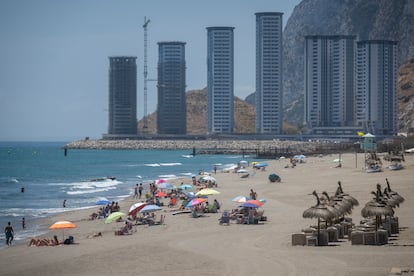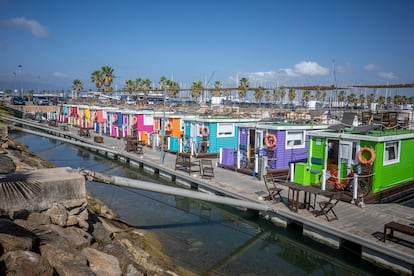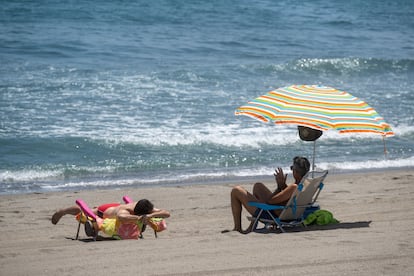Neither ugly nor unsafe: Spain’s La Línea shakes off prejudices in its tourist awakening
The town in Cádiz is struggling to move on from the stigma of drug trafficking while seeing its visitor numbers grow by 10%: ‘As we are the last to arrive, we see the failures of others and we don’t want to repeat them,’ says the mayor


The coastal road trip of Spaniards Luis Yubero, Cristina Sanmartín and their two children includes lunch with enviable views of the Rock of Gibraltar. The easterly wind blows, cooling and humidifying the atmosphere in La Línea de la Concepción, while roasting the rest of Cádiz. The beach bar is half full, people sunbathing on the uncrowded fine, black sand beach of Levante. This does not seem to be where “the ugliest town in Spain” is supposedly located, as the French film Me, Myself and Mum satirically described it; nor is it a town devoid of law and order, a label more than one Spanish media outlet has attributed to La Línea. “I knew about all that, but it has not influenced our decision to stay the night,” says Yubero, shrugging his shoulders.
Like the Yubero-Sanmartín family, thousands of tourists occupied an average of 89% of the 3,511 accommodation places (according to the Tourism Registry of the Andalusian regional government) in La Línea during July. The figure, provided by the Horeca Cádiz hoteliers federation, was so high that La Línea was placed as the third-busiest town in the province, behind Rota and Conil. It is also almost 20% more than the average four years ago, according to the city council’s tourism delegation. “The city is regenerating and we are seeing tourist occupation,” says the mayor, Juan Franco. Hoteliers, restaurateurs and tourist agents confirm the municipal optimism. “The future is in the air,” predicts Javier Ramos, owner of the Caramba beach bar, where the Galician couple and their children enjoyed lunch on a Tuesday in late July. In the family plan was to walk around the town, visit Gibraltar, and spend the night in La Línea before continuing on their way to Tarifa.

But that carefree plan, similar to what one might expect in any Spanish coastal town in the middle of summer, was not the norm in La Línea just five years ago. Just when the media portrayal of the wanderings of the local drug lord — featuring hospital escapes, persecutions, and life at full speed — was sinking the town’s image, the municipal tourism technician at the Gibraltar border office, Inmaculada Escuadra, became used to a question: “Everyone who came here wanted to know if the town was safe. Now, they say it less, although those doubts have not entirely disappeared.” Franco goes further and says that tourism in La Línea has been limited for years to relatives of residents, Linenses, who emigrated from the town, and visitors who “stayed here because it was cheaper and came with the idea of ‘well, let’s go to La Línea to see if we get shot.”
Councillor for Tourism Mercedes Atanet cites the example of what happened with the now defunct “Free Time Residence” plan promoted by the regional government of Andalusia, which was designed for workers and their families to spend their holidays in the area: “They came here upset because they asked for somewhere else and ended up here, but in the end they left delighted.” The bad press around La Línea that filled those forced visitors with prejudices came not only in the sensational headlines about the drug traffickers, now with little desire for cockiness with the police encirclement of the Ministry of Interior. La Línea — a city that emerged 154 years ago from the segregation of neighboring San Roque — earned the label of a municipality with few charms, increased by satires such as Me, Myself and Mum (2013), in which the protagonist’s parents give him an initiation trip to the “ugliest” point in town, where he also stayed with the “only family that didn’t take drugs.”
Franco now recall this with irony while talking about a promotional video for the town, recorded with the collaboration of the pianist Diego Valdivia, which the city council will present at the next edition of the Fitur tourism fair. The recording highlights its unspoilt beaches, golf courses, and colourful, traditional 19th-century architecture. But if there is one image that is going viral on social media, it is that of the hotel made up of 18 floating houses moored in the Alcaidesa Marina, unique in Spain and created in 2019 on the initiative of an Argentine couple. “This city is like a diamond in the rough, unknown and punished by the press and politicians,” complains one of its owners, Barbara Rojkes, who says she has measured occupancies of between 60% in winter and up to 90% in summer.
In a city of 63,700 inhabitants with unemployment rates that reach 30%, neighborhoods with social exclusion problems, a small municipal area that limits industrial options, and the direct influence of nearby Gibraltar, the City Council knows what it is at stake with tourism and is looking to increase the number of beds on offer. “It is still an incipient plan, but steps are being taken towards a friendly city,” Franco points out, although the mayor is aware of the pitfalls that other tourist towns are now suffering, besieged by gentrification and housing problems. “As we are the last to arrive, we see the failures of others and we don’t want to repeat them. Last year, a visitor told me that it was a shame that La Línea was hardly being promoted. I answered: ‘And who said we want more people to come?’”
In fact, the tourism department has another primary objective on its radar: to extend tourism throughout the year, with cultural activities such as the recent La Línea Flamenca festival held at the end of July, or concerts beyond the summer months. Rojkes sees it as such an achievable plan that she is beginning to embrace it: “The location, the proximity to other places, and above all the presence of Gibraltar guarantees us many repeat clients in the low season.” Escuadra also sees it as feasible, judging by the profile of visitor who comes to her office: “Families or senior travellers who spend two to three days in the town.” Added to this is the incipient interest of European fans, specialists and researchers in fortification tourism: La Línea is full of 18th-century defensive fortresses and bunkers dating from the Second World War.

Carlos Kóndor, a Chilean living in Malaga, and his daughters Isidora and Sofía have not stopped in La Línea based on these selling points. “We were on our way to visit Cádiz and it was an impromptu stop to see the Rock from the outside,” he explains on the border, at the doors of the tourist office. But when the family finds out about day trips to Gibraltar, and the gastronomy, leisure activities and beaches on offer in La Línea, they begin to entertain the idea of changing their plan and leaving Cádiz for another day. “The truth is that I didn’t know the town,” explains the father while they weigh up what to do. “We must be doing something right. This is only going to get better,” says Escuadra proudly before attending to the family.
Sign up for our weekly newsletter to get more English-language news coverage from EL PAÍS USA Edition
Tu suscripción se está usando en otro dispositivo
¿Quieres añadir otro usuario a tu suscripción?
Si continúas leyendo en este dispositivo, no se podrá leer en el otro.
FlechaTu suscripción se está usando en otro dispositivo y solo puedes acceder a EL PAÍS desde un dispositivo a la vez.
Si quieres compartir tu cuenta, cambia tu suscripción a la modalidad Premium, así podrás añadir otro usuario. Cada uno accederá con su propia cuenta de email, lo que os permitirá personalizar vuestra experiencia en EL PAÍS.
¿Tienes una suscripción de empresa? Accede aquí para contratar más cuentas.
En el caso de no saber quién está usando tu cuenta, te recomendamos cambiar tu contraseña aquí.
Si decides continuar compartiendo tu cuenta, este mensaje se mostrará en tu dispositivo y en el de la otra persona que está usando tu cuenta de forma indefinida, afectando a tu experiencia de lectura. Puedes consultar aquí los términos y condiciones de la suscripción digital.








































